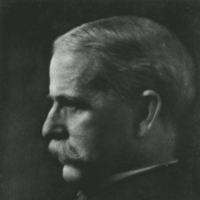New Year's Eve
I
The other night I had a dream, most clear
And comforting, complete
In every line, a crystal sphere,
And full of intimate and secret cheer.
Therefore I will repeat
That vision, dearest heart, to you,
As of a thing not feigned, but very true,
Yes, true as ever in my life befell;
And you, perhaps, can tell
Whether my dream was really sad or sweet.
II
The shadows flecked the elm—embowered street
I knew so well, long, long ago;
And on the pillared porch where Marguerite
Had sat with me, the moonlight lay like snow.
But she, my comrade and my friend of youth,
Most gaily wise,
Most innocently loved, —
She of the blue—grey eyes
That ever smiled and ever spoke the truth, —
From that familiar dwelling, where she moved
Like mirth incarnate in the years before,
Had gone into the hidden house of Death.
I thought the garden wore
White mourning for her blessed innocence,
And the syringa’s breath
Came from the corner by the fence,
Where she had made her rustic seat,
With fragrance passionate, intense,
As if it breathed a sigh for Marguerite.
My heart was heavy with a sense
Of something good forever gone. I sought
Vainly for some consoling thought,
Some comfortable word that I could say
To the sad father, whom I visited again
For the first time since she had gone away.
The bell rang shrill and lonely, —then
The door was opened, and I sent my name
To him, —but ah! 't was Marguerite who came!
There in the dear old dusky room she stood
Beneath the lamp, just as she used to stand,
In tender mocking mood.
“You did not ask for me,” she said,
“And so I will not let you take my hand;
”But I must hear what secret talk you planned
“With father. Come, my friend, be good,
”And tell me your affairs of state:
“Why you have stayed away and made me wait
”So long. Sit down beside me here, —
“And, do you know, it seemed a year
”Since we have talked together, —why so late?"
Amazed, incredulous, confused with joy
I hardly dared to show,
And stammering like a boy,
I took the place she showed me at her side;
And then the talk flowed on with brimming tide
Through the still night,
While she with influence light
Controlled it, as the moon the flood.
She knew where I had been, what I had done,
What work was planned, and what begun;
My troubles, failures, fears she understood,
And touched them with a heart so kind,
That every care was melted from my mind,
And every hope grew bright,
And life seemed moving on to happy ends.
(Ah, what self—beggared fool was he
That said a woman cannot be
The very best of friends?)
Then there were memories of old times,
Recalled with many a gentle jest;
And at the last she brought the book of rhymes
We made together, trying to translate
The Songs of Heine (hers were always best).
“Now come,” she said,
“To—night we will collaborate
”Again; I’ll put you to the test.
“Here’s one I never found the way to do, —
”The simplest are the hardest ones, you know, —
“I give this song to you.”
And then she read:
Mein kind, wir waren Kinder,
Zei Kinder, jung und froh.
* * * * * * * * * *
But all the while a silent question stirred
Within me, though I dared not speak the word:
“Is it herself, and is she truly here,
”And was I dreaming when I heard
“That she was dead last year?
”Or was it true, and is she but a shade
“Who brings a fleeting joy to eye and ear,
”Cold though so kind, and will she gently fade
“When her sweet ghostly part is played
”And the light—curtain falls at dawn of day?"
But while my heart was troubled by this fear
So deeply that I could not speak it out,
Lest all my happiness should disappear,
I thought me of a cunning way
To hide the question and dissolve the doubt.
“Will you not give me now your hand,
”Dear Marguerite," I asked, “to touch and hold,
”That by this token I may understand
“You are the same true friend you were of old?”
She answered with a smile so bright and calm
It seemed as if I saw new stars arise
In the deep heaven of her eyes;
And smiling so, she laid her palm
In mine. Dear God, it was not cold
But warm with vital heat!
“You live!” I cried, “you live, dear Marguerite!”
Then I awoke; but strangely comforted,
Although I knew again that she was dead.
III
Yes, there’s the dream! And was it sweet or sad?
Dear mistress of my waking and my sleep,
Present reward of all my heart’s desire,
Watching with me beside the winter fire,
Interpret now this vision that I had.
But while you read the meaning, let me keep
The touch of you: for the Old Year with storm
Is passing through the midnight, and doth shake
The corners of the house, —man oh! my heart would break
Unless both dreaming and awake
My hand could feel your hand was warm, warm, warm!

